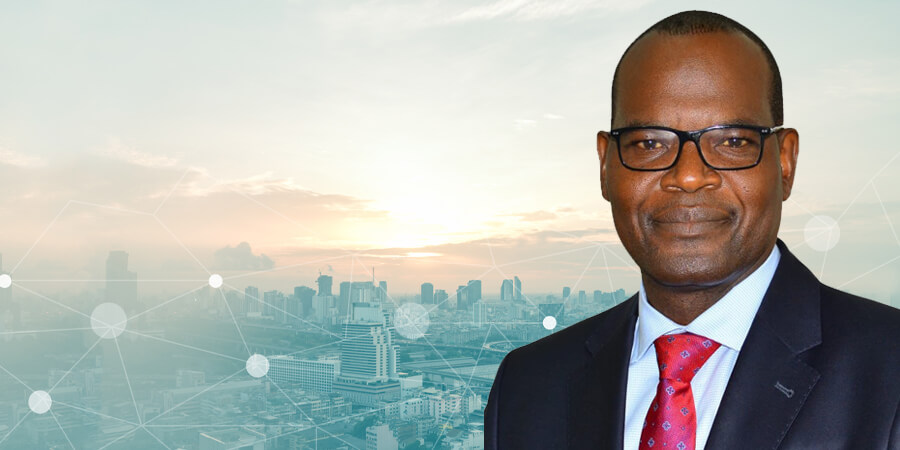Telecom Review Africa conducted an exclusive interview with Mr. John Omo, SecretaryGeneral, African Telecommunications Union, who is also a 2022 recipient of the Telecom Review ICT Leader-of theYear Award in the Governmental/ Non-Governmental category, to discuss the mission and biggest challenges of the ATU. Also, he shed light on some of the most promising technologies for accelerating digital transformation in Africa. He stated some notable future plans and goals for the organization.
Can you tell us more about the mission of the African Telecommunications Union?
The African Telecommunications Union (ATU) is a specialized agency of the African Union responsible for promoting the development of telecommunications and ICT in Africa. Our mission is to provide the necessary platform for cooperation and collaboration among African countries in the development and use of telecommunications and ICTs.
To achieve this mission, we work with our 51 member states and 56 associate members, together with other stakeholders, to develop policies, regulations and standards that promote the growth of the telecommunications and ICT sector in Africa. We also organize conferences, workshops and other events to facilitate knowledge sharing and collaboration among African countries.
What are some of the biggest challenges Africa is facing in terms of achieving digital transformation, and how do you think these can be addressed?
Achieving digital transformation is crucial for Africa’s development, but the continent faces several challenges in this regard, more significantly the challenge of inadequate ICT infrastructure, such as the fiber optic network, that would support delivery of broadband services. While broadband penetration has increased in recent years globally, it remains low in many parts of Africa, and therefore there is a need for Africa to enhance its investment in cutting-edge ICT infrastructure.
In addition to infrastructure challenges, low digital skill levels among the population is another issue. Many Africans lack the necessary digital skills to participate in the digital economy, making it difficult for them to access new jobs and business opportunities and improve their livelihoods. This is particularly true for rural areas, where access to digital training and education is limited. To address these challenges, African countries need to prioritize infrastructure development, such as expanding broadband access and building more fiber optic networks. Governments should also promote innovation and local content by supporting local entrepreneurs and start-ups. Investing in skills development and digital literacy programs is also crucial to ensure that all Africans have the necessary skills to participate in the digital economy.
In your opinion, what are some of the most promising technologies for accelerating digital transformation in Africa?
There are several promising technologies for accelerating digital transformation in Africa, including 5G networks, cloud computing, artificial intelligence and the Internet of Things (IoT). These technologies have the potential to transform industries, improve service delivery and enhance the quality of life for Africans. By enabling faster data transfer rates and reduced latency, 5G networks can help facilitate the growth of other emerging technologies, such as autonomous vehicles, smart cities and virtual reality applications. Cloud computing, on the other hand, can help organizations and governments in Africa manage data and applications more efficiently. Cloud-based services provide scalability, flexibility and cost savings, making them an ideal solution for businesses and governments looking to streamline their operations. Artificial intelligence (AI) is another technology with great potential to transform Africa’s economy. AI can help organizations in Africa improve their efficiency, productivity and decision-making capabilities. With the use of machine learning algorithms, AI can analyze vast amounts of data and identify patterns that can lead to improved business processes and new revenue streams.
The Internet of Things (IoT) is another technology that can accelerate digital transformation in Africa. The IoT is a network of interconnected devices that can collect and exchange data, making it possible to automate many processes and services. IoT applications can be used in a variety of industries, from agriculture to healthcare, to improve service delivery and reduce costs. These technologies have the potential to drive significant economic growth and social development in Africa. By investing in these technologies and building the necessary infrastructure to support them, African governments and businesses can take advantage of the opportunities offered by digital transformation and lead the continent into a prosperous future.
What advice would you give to African governments and organizations looking to embark on their own digital transformation journeys?
African governments and organizations must prioritize infrastructure development, invest in skills development and digital literacy programs, promote innovation and local content, and collaborate with other stakeholders to drive digital transformation. Infrastructure development is crucial for enabling digital transformation. African governments and organizations should invest in building reliable and affordable broadband infrastructure, data centers and cloud services to support the implementation of emerging technologies such as artificial intelligence, machine learning and the Internet of Things. Investing in skills development and digital literacy programs is also essential to drive digital transformation.
Governments and organizations should prioritize training and capacity-building programs to ensure that their workforce has the necessary skills to adopt and utilize digital technologies. These programs should be designed to reach a broad range of individuals, from high school students to professionals in various fields. Promoting innovation and local content is another critical aspect of digital transformation in Africa. African governments and organizations should encourage the development of local technology solutions and support the growth of the local tech industry. This can be done through initiatives such as start-up incubators, funding opportunities and collaborations with local universities and research institutions.
What notable future plans and goals lie ahead for ATU?
ATU has several plans and goals for the future, including promoting the development of 5G networks in Africa, supporting the growth of the digital economy, promoting cybersecurity and data protection, and working to bridge the digital divide between and within African countries. We are committed to driving digital transformation in Africa and ensuring that all Africans can benefit from the opportunities that ICTs provide. ATU’s commitment to bridging the digital divide between African countries involves promoting connectivity in rural and underserved areas, ensuring that all Africans have access to affordable and reliable Internet services, and promoting digital literacy and skills development. By bridging the digital divide, ATU aims to ensure that all Africans can benefit from the opportunities provided by ICTs and contribute to the development and growth of the continent.







